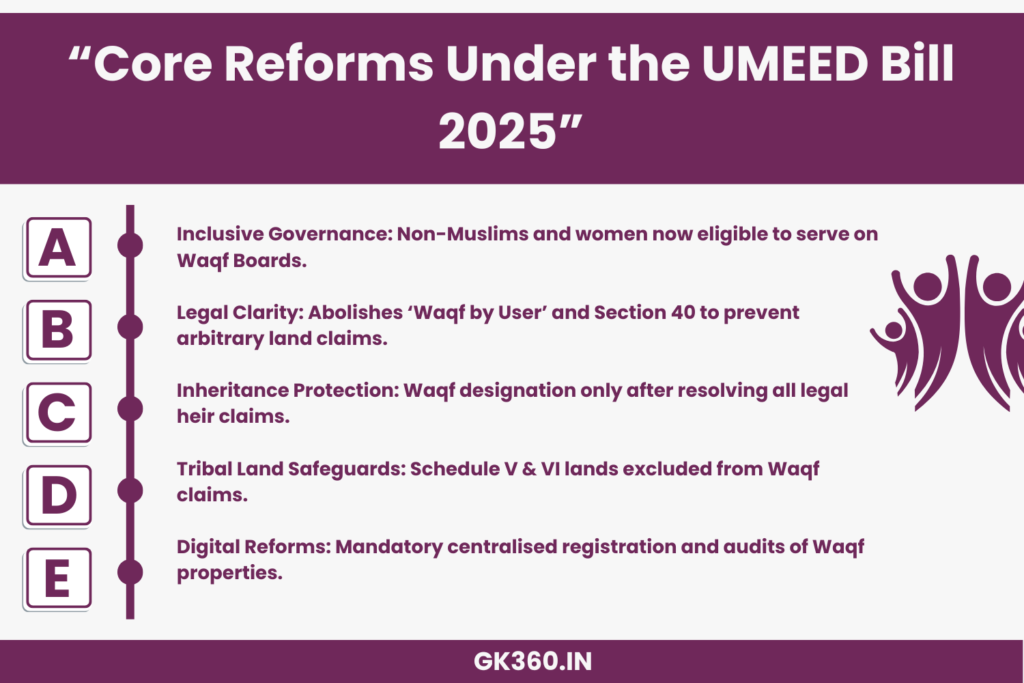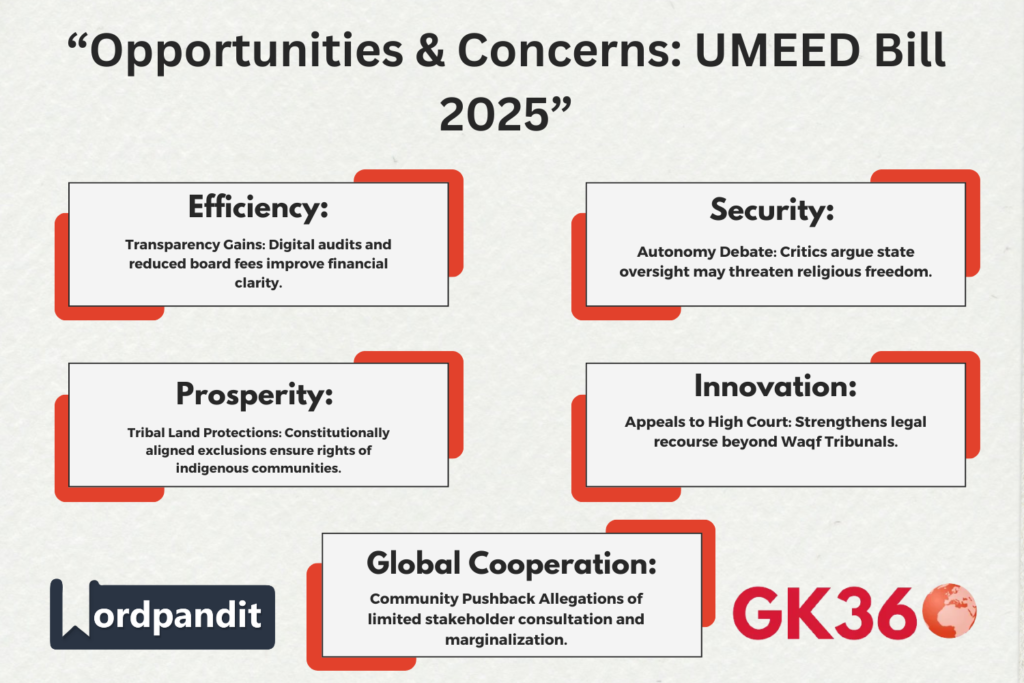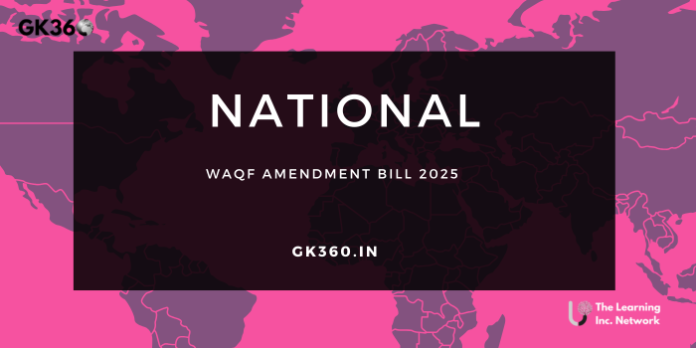Waqf Amendment Bill 2025 (UMEED Bill): Key Reforms, Legal Implications & Community Impact
Introduction: What Is the UMEED Bill 2025?
The Waqf Amendment Bill 2025, officially renamed the UMEED Bill (Unified Management Empowerment Efficiency and Development), marks a transformative milestone in India’s approach to religious and charitable property governance. Passed by the Lok Sabha on April 2, 2025, the bill aims to introduce a more transparent, inclusive, and digitally streamlined management system for Waqf properties.
With reforms ranging from digital property registration and inclusive board composition to inheritance safeguards and tribal land protections, the UMEED Bill overhauls the existing Waqf Act of 1995. As India manages over 8.7 lakh Waqf properties—among the largest land holdings in the country—this reform is both monumental and deeply consequential for the nation’s socio-religious landscape.
In this article, we break down the origins, legal structure, key provisions, and potential impact of the UMEED Bill, while also addressing the major criticisms and legal controversies surrounding it.

Table of Contents
- Understanding Waqf: Meaning and Legal Foundations
- Historical Background of Waqf Governance in India
- Why the UMEED Bill 2025 Was Introduced
- Key Provisions of the Waqf Amendment Bill 2025
- Benefits of the Waqf Amendment Bill 2025
- Criticisms and Concerns Raised
- What the UMEED Bill Means for the Future of Waqf in India
- FAQs: Understanding the Waqf Amendment Bill
- Conclusion: Towards a Transparent and Accountable Waqf System
Understanding Waqf: Meaning and Legal Foundations
A Waqf is a permanent dedication of property—typically by a Muslim individual—for religious, charitable, or community purposes. Once designated, Waqf property cannot be reclaimed, inherited, or sold, and its ownership is considered to belong to God. However, its benefits must serve the designated cause—be it a mosque, orphanage, school, or public utility.
Key Characteristics of Waqf:
- Voluntary Dedication: Created via a deed, will, or even oral declaration.
- Irrevocable in Nature: The property, once Waqf, cannot revert to the donor.
- Perpetual Use: Long-term religious or charitable use defines its legitimacy.
- Legally Protected: Governed by specific laws like the Waqf Act, 1995.
India maintains one of the largest Waqf infrastructures globally. These properties are managed by State and Central Waqf Boards, making them pivotal actors in land management and minority welfare.
Historical Background of Waqf Governance in India
The concept of Waqf in India dates back to the Delhi Sultanate, when rulers like Sultan Muizuddin Sam Ghaor allocated land for religious institutions. Over centuries, Islamic dynasties expanded Waqf holdings, embedding them deeply into India’s socio-religious fabric.
Key Legal Milestones:
- 1913 – Mussalman Waqf Validating Act legalized religious dedications post-British opposition.
- 1954 – First Waqf Act passed post-independence, formalizing Waqf Boards.
- 1964 – Central Waqf Council was established to oversee state compliance.
- 1995 – A revamped Waqf Act enhanced dispute resolution and board authority.
Despite these frameworks, issues like encroachments, mismanagement, and opaque registrations persisted—prompting calls for modernization.
Why the UMEED Bill 2025 Was Introduced
The Waqf Amendment Bill 2025 (UMEED) was tabled to resolve chronic inefficiencies and criticisms tied to the existing Waqf law.
Key Reasons for Reform:
- Digitization & Transparency: Reduce manual manipulation through centralized registration.
- Conflict Prevention: Address ambiguities like the controversial ‘Waqf by User’ clause.
- Inclusive Governance: Bring external accountability by adding non-Muslim members to boards.
- Legal Clarity: Remove overlapping jurisdictions and safeguard tribal & inherited land.
The government emphasizes that these reforms will empower Waqf institutions, not weaken them—though this remains a matter of public debate.
Key Provisions of the Waqf Amendment Bill 2025
The UMEED Bill 2025 introduces landmark reforms aimed at improving governance, enhancing inclusivity, and preventing misuse of Waqf assets. Here’s a breakdown of the core changes:
1. Inclusive Governance
- Non-Muslim Representation: For the first time, non-Muslims will serve on Central and State Waqf Boards, ensuring external accountability and broader representation.
- Gender Inclusivity: Provisions open up board positions to women and other underrepresented voices, aiming for more balanced decision-making.
2. Legal and Property Reforms
- Abolition of ‘Waqf by User’: Long-standing use of a property for religious purposes can no longer automatically make it Waqf. Existing cases remain valid unless disputed.
- Scrapping of Section 40: Removes Waqf Board authority to unilaterally declare any land as Waqf—preventing overreach and arbitrary acquisition.
- Inheritance Protection: A property can no longer be declared Waqf until all rightful inheritance claims (especially of women and orphans) are settled.
- Schedule V & VI Protections: Tribal lands are explicitly protected from being declared Waqf, aligning with constitutional safeguards.
3. Structural and Judicial Revisions
- Waqf Tribunal Composition: Retains the three-member tribunal structure (based on JPC recommendation) instead of a proposed two-member model.
- Dispute Resolution Shift: In land disputes involving the government, a senior official (above Collector rank) will decide ownership—not the tribunal.
- Right to Appeal: Parties can now appeal tribunal decisions to the High Court, improving legal recourse.
4. Digital and Financial Reforms
- Mandatory Digital Registration: All Waqf properties must be uploaded to a centralised digital portal within six months, enhancing transparency and traceability.
- Audit Requirements: Institutions earning over ₹1 lakh annually must undergo mandatory financial audits.
- Reduced Board Contribution: The contribution by Waqf institutions to their respective boards is reduced from 7% to 5%, freeing up funds for charitable work.
Benefits of the Waqf Amendment Bill 2025
The reforms introduced by the UMEED Bill are designed to address long-standing concerns about Waqf governance in India.
Transparency and Digitisation
- Centralised property data reduces chances of mismanagement or illegal sales.
- Mandatory audits increase financial accountability.
Legal Clarity
- Clear exclusions for tribal lands and inheritance safeguard rights.
- Removal of vague provisions like Section 40 and ‘Waqf by user’ prevents legal overreach.
Enhanced Representation
- Board reforms open space for women and non-Muslims, increasing public trust.
- Reduces insularity in decision-making.
Reduced Government Overlap
- Dispute resolutions streamlined via senior officials, avoiding tribunal overload.
Criticisms and Concerns Raised
Despite its forward-looking goals, the Waqf Amendment Bill has sparked significant controversy, especially within sections of the Muslim community and legal experts.
Religious Autonomy Under Threat?
Critics argue that provisions like non-Muslim board members and government-led dispute resolution infringe on Articles 25 and 26 of the Constitution, which protect religious freedom and management of religious affairs.
Community Exclusion
Allegations have emerged that stakeholders were not consulted adequately during the drafting process, undermining community participation.
Tribunal Power Dilution
Replacing Waqf Tribunal authority with government officials could politicize property disputes and reduce legal impartiality.
Ambiguity Around ‘Waqf by User’ Removal
Removing this clause may threaten historically significant religious sites that lack documentation but have been used for generations.
What the UMEED Bill Means for the Future of Waqf in India
The Waqf Amendment Bill 2025 could redefine how religious endowments function in India. If implemented effectively, it has the potential to:
- Clean up opaque land records
- Strengthen Waqf institutions’ financial sustainability
- Foster inclusive, accountable governance
However, for it to succeed, trust-building with stakeholders is critical. Reforms must not be perceived as top-down interference but as a shared effort to protect community assets.

FAQs: Understanding the Waqf Amendment Bill
- What is the UMEED Bill 2025?
The UMEED Bill (Unified Management Empowerment Efficiency and Development) is the new name for the Waqf Amendment Bill 2025, which seeks to reform how Waqf properties are governed in India.
- Can non-Muslims now serve on Waqf Boards?
Yes, the bill mandates the inclusion of non-Muslim members on both Central and State Waqf Boards to promote transparency and diverse perspectives.
- Why was ‘Waqf by User’ removed?
To prevent ambiguity and misuse, the bill removes automatic Waqf status based on prolonged religious use without documentation.
- What protection exists for tribal lands under the bill?
Properties listed under Schedule V and VI of the Constitution are explicitly protected from being designated as Waqf.
- What happens if a Waqf Board and government dispute ownership?
A senior officer above the Collector rank will now investigate such disputes, with appeals allowed to the High Court.
Conclusion: Towards a Transparent and Accountable Waqf System
The Waqf Amendment Bill 2025, officially titled the UMEED Bill (Unified Management Empowerment Efficiency and Development), marks a historic turning point in the governance of religious and charitable endowments in India. As one of the most extensive overhauls of the Waqf Act, 1995, this reform reflects a broader national agenda—bringing greater transparency, legal consistency, digital efficiency, and inclusive representation into systems that manage vast public and community assets.
By introducing digital registration, audit mandates, and legal clarity on ownership, the bill tackles long-standing challenges such as encroachments, corruption, bureaucratic red tape, and conflicts over land rights. The inclusion of non-Muslim and women members in Waqf Boards reflects an evolving understanding of governance that values diversity, external oversight, and participatory decision-making.
Yet, it is important to recognize that legislation alone cannot bring transformation. The effectiveness of the UMEED Bill will depend on how it is implemented on the ground, especially in regions where Waqf properties are vulnerable to exploitation or legal ambiguity. Key to this success will be:
- Community Engagement: Building trust with the Muslim community is essential. Dialogue with religious leaders, civil society organizations, and local stakeholders must be ongoing—not limited to the drafting stage.
- Capacity Building: Waqf Boards must be equipped with trained personnel, legal expertise, and financial management systems to uphold the new regulatory framework effectively.
- Digital Infrastructure: The centralized digital portal must be accessible, secure, and user-friendly, with clear mechanisms for data updates, dispute redressal, and public transparency.
- Balanced Oversight: While increased state involvement may reduce misuse, it must not compromise religious autonomy or constitutional safeguards. A sensitive balance between accountability and freedom of faith must be preserved.
The UMEED Bill is not just a policy document—it is a blueprint for the future of religious property governance in India. If implemented with integrity, sensitivity, and cooperation, it can ensure that Waqf properties truly serve their intended purpose: uplifting communities, enabling charity, and preserving religious and cultural heritage.
Key Takeaways Table
| Aspect | Details |
| Bill Name | UMEED Bill (Unified Management Empowerment Efficiency and Development) |
| Passed On | April 2, 2025 in Lok Sabha |
| Core Objectives | Transparency, digital governance, legal clarity, inclusive representation |
| Major Reforms | Abolishment of ‘Waqf by User’, Section 40, digital registration, tribal protections |
| Board Composition | Inclusion of non-Muslims and women in Central & State Waqf Boards |
| Legal Enhancements | Right to appeal to High Court, dispute resolution by senior officers |
| Criticisms Raised | Threat to religious autonomy, inadequate stakeholder consultation, reduced tribunal authority |





